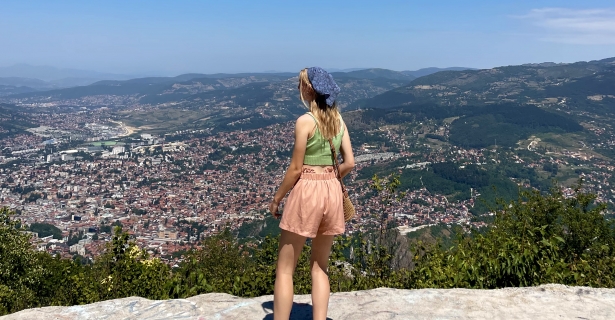A great thing about working for CANVAS, and the ability to work remotely, is that they encouraged us to travel, especially around the rest of the Balkans. Travel is fun, yes, but it can also be incredibly informative. For a few weeks in late July, most of the office was on vacation, and our boss encouraged us to explore as well (though we did this mostly on the weekends, since we were not off).
One of my favorite places I went to during my time in the Balkans was Sarajevo, the capital of Bosnia and Herzegovina. Its old city is beautiful, and the main street is marked at the split between the old Austro-Hungarian and Ottoman sections of the city–there is a noticeable difference in architecture and street setup between the two sections. On a more serious note, we also visited a display at Sarajevo’s city hall that documented the 1992-1995 war crimes committed in Bosnia-Herzegovina, as well as the investigations and eventual trials conducted by the International Criminal Tribunal for the Former Yugoslavia. That was difficult to walk through and absorb, but I think it’s important to know everything about the places I visit, fascinating and horrifying history alike. In Sarajevo, you often get both at once–we went into a shop in the Ottoman section of the old city, on a street called Kazandžiluk (in English, Coppersmiths Street), and as we were browsing, the shopkeeper told us about being near a mortar round when it hit the street while playing soccer with a friend. They were about 10 years old–he showed us the scars on his leg and told us about growing up during the war. It seemed so casual, the way he talked about it, and he was also friendly, generous, and told us more about the history of Kazandžiluk as well as the events of the war.
Remembering the dark parts of history, and commemorating the victims of such terrible violence, is extremely important for healing. The pain that the war caused, and the pain that similar episodes of hatred and violence could cause elsewhere, should not be forgotten or used as a justification for further violence; rather, it can and should be used to build a foundation for peace and growth, to ensure nothing like that happens again and allow people, along with their countries, to move forward without forgetting those they loved and carry with them.

